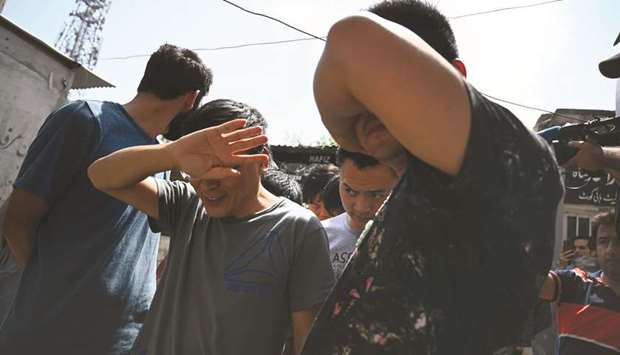Pakistan has arrested dozens of Chinese men and their local agents in a crackdown this week against traffickers targeting young women as brides, officials said yesterday.
The arrests were made in various cities of the central province of Punjab since Sunday, said Saeed Abbasi from the Federal Investigation Agency (FIA).
Half a dozen women were rescued during the operation.
The swoop was launched after several, mostly Christian, Pakistani women were lured by the prospect of marriage with Chinese men, trafficked to China and forced to become prostitutes.
Most of the girls were rescued by the Chinese authorities after the Pakistani embassy in Beijing alerted officials, Abbasi added.
“Chinese gangs have been working in a very organised way,” said the FIA’s Tariq Rustam Chohan, who led the action in Lahore.
He said that at least 30 Chinese and more than a dozen of their local agents had been arrested from Lahore alone.
Thousands of Chinese people from state-run and private companies travel to Pakistan every year to work on various projects under a scheme called the China-Pakistan Economic Corridor (CPEC).
Pakistan is also involved in some $62bn of infrastructure investments as part of China’s huge Belt and Road initiative.
The members of trafficking rackets might have taken advantage of relaxed visa policies for Chinese citizens, Abbasi said.
Posing as wealthy businessmen, the Chinese had targeted young women from impoverished Christian families, promising them a better life in China, the FIA’s Jamil Ahmed Mayo said.
Once married in Pakistan, the women would be given lessons in basic Chinese before being taken to China by their new husbands, Mayo said.
The women complained that they were treated badly by their Chinese husbands, tortured and forced to become prostitutes.
Mayo’s team arrested a number of Chinese men and their local facilitators.
Many such go-between were priests, who would help identify victims and arrange marriages.
Other local agents were men and women from both the Christian and Muslim community who would help their Chinese collaborators rent houses, visit churches, and arrange passports and visas for their intended victims.
Chinese gangs had hired these agents on lucrative salaries, Mayo said.
“They know about the trafficking and were partners in crime. In some cases, the agents put pressure on the families of the girls to keep quiet,” he said. “Their networks are very closely knit and work with each other.”
The Chinese embassy in Islamabad did not respond to questions about the arrests, although it had warned Pakistani citizens in an earlier statement against becoming prey to organised trafficking gangs.
The positive projection of China and its people in Pakistani media meant that victims were more susceptible to being tricked, rights activists Taimur Kamal said.
“When people have a positive image of a nation in their mind, they tend to trust its citizens without any fear. That’s might have led families becoming willing victims in these cases,” he said.

Detained and handcuffed Chinese nationals hide their faces as they arrive at a court in Islamabad after being arrested by Federal Investigation Agency (FIA) officials for alleged involvement in a trafficking ring to lure women into fake marriages, then forcing them into prostitution in China.
